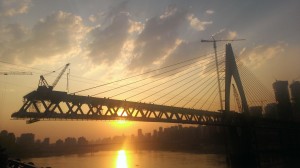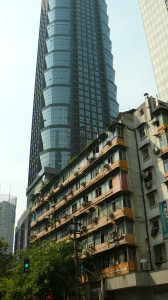As well the commercial opportunities created by China’s rapid urbanisation there are also many personal challenges that affect those who move to developing cities. Adam McWhirter from Maxxelli Real Estate compares two of China’s cities on the up and finds that both have undergone major transformations in a relatively short period of time, making them more attractive places to live. He provides some advice on how to adapt to life in a developing city and how to get the most out of the experience.
If you’re about to move to a first-tier city in ‘developing China’ there are still challenges to face. But deciding between whether to move to Puxi or Pudong is a far cry from choosing between Changsha or not taking the new position at  all because you’re unsure about venturing into the unknown.
all because you’re unsure about venturing into the unknown.
Comparing two of China’s most rapidly developing cities — Chengdu and Chongqing — we can see some of the major developments over the past five years and how expats have been directly affected.
As a comparison I’m going to use the international schools as a barometer for expat development in each city. It is difficult to accurately say how many travellers are in and out of the city, but as a guideline the number of international school aged children is a useful stat. In June 2008 Chengdu had less than 425 and Chongqing less than 75. Fast forward to September 2013 and Chengdu and Chongqing have just over 1,250 and just over 300 respectively. During this period of time both cities have undergone transformations that have clearly added to their appeal as places to live, as we can see below.
Summer 2008
Chengdu
The main north/south roadway, Renmin Nanlu, had just been completed, which marked the beginning of the southern movement in Chengdu. Up until this point the majority of expat life was just south of the 2nd ring road, but beyond that remained the unknown. A few families ventured to the deep-south, but the majority of daily life was still pretty central.
Chongqing
The expat community was shrinking in size due to some current projects nearing completion, but also the onset of the global recession. Chongqing had yet to prosper from the economic advantages that have been put in place in recent years. Expats generally stayed in the north due to higher quality living conditions and the only available Western food was found in fast food chains and five-star hotels The city was just on the verge of developing, but was still quite raw compared to the more international standards of Chengdu and the rest of first-tier China.
Summer 2013
Chengdu
Although Chengdu was always a relatively liveable city it is now well on its way to first-tier status. On 1st June the elevated 2ndring road was opened which, along with the Renmin Nanlu roadway, vastly increases the accessibility of the city.
Expat life is now forging southwards. In July 2013 the 1.5 million square metre Global Centre opened just outside the 3rdring road, which is world’s largest commercial building containing hotels, office space and the largest shopping centre in Chengdu. The 2nd phase of the renowned Tianfu Community, Chengdu’s most renowned villa compound created specifically for expats, was also launched in August. The draw to the south of Chengdu is strong, not only for the expat community, but for all of Chengdu’s growing middle class.
With the establishment of three international schools, two metro lines and four international serviced apartments, and with new five-star hotels, foreign restaurants and international shopping centres opening monthly, Chengdu has been transformed into one of the most liveable cities in China. In just five short years there has been a large increase in the quality of life for expats residing there.
Chongqing
Over the past five years Chongqing’s growth has been well documented. As a city carved with rivers and  mountains a ring road transportation network was never going to be possible. Instead, to create a flowing city, Chongqing has developed a network of bridges crossing both the Jialing and Yangtze Rivers. The two newest bridges, entering the central business district (CBD), will be finished within the year.
mountains a ring road transportation network was never going to be possible. Instead, to create a flowing city, Chongqing has developed a network of bridges crossing both the Jialing and Yangtze Rivers. The two newest bridges, entering the central business district (CBD), will be finished within the year.
The expat community is scattered throughout the Yuzhong Peninsula and northern Chongqing amongst the Two Rivers New Zone, a development zone which has just celebrated its second anniversary. Chongqing’s development has been rapid, but change witnessed in northern Chongqing, between the two rivers, has been dramatic.
Yewchung International School is filling out the brand new campus, which is located in north Chongqing within five kilometres of the majority of the villa compounds. Also, there are now four metro lines crisscrossing the city with the third line connecting north Chongqing to the airport and Jiefangbei CBD.
Chongqing has transformed from a backwater hardship city into a megalopolis and its expat residents have seen their options of where to live and where to eat increase exponentially.
Some rules for survival
For those that are planning to move to developing cities in China, the choices you make need to be based on the future development of the city. Besides taking language and cultural lessons, below are some tips for surviving the urbanisation of China’s most rapidly developing cities:
Know the city
As the above cases illustrate urbanisation can be dramatic. You really need to do your homework before selecting a location. What might seem like a relatively quiet home in a peaceful neighbourhood today could easily see a major elevated roadway running next door by the time your lease expires. On the other hand, what seems like a distant suburb today could see the benefits of a new metro line reaching the compound within a short number of years.
The biggest lesson here is to ask questions when you are searching for new properties in a new city. It is important to look at the most popular expat communities today, but also realise where things will shift tomorrow.
Don’t view China through five-star lenses
This is obviously good advice no matter where you move. It is important to remember where the city has come from. This does not require you to spend a year living on the farm, or in the less-developed communities within your new city, but it does not hurt to spend time in these areas. Grab a friend or a translator and spend some time visiting tea shops or having lunch in the older neighbourhoods. Take the time to speak with the long-term residents and learn to appreciate the changes they have witnessed.
Climb that mountain
Whereas the notion of climbing a mountain may run contrary to the aim of acclimatising to a vast urban environment, arriving in one of China’s numerous cities of more than five million people can even get to hardened China expats. When homesickness sets in it is important to remember that the city sprawl does eventually come to an end. Whether you are interested in history, nature or more urbanisation, if you stay at home and do not explore your new country you may very well find yourself spending your time counting down the days until your next trip abroad. Everyone comes to China for different reasons, but the most well-adjusted families are those that take the time to explore.
Stop Comparing
If you spend your days comparing developing China to your hometown you may find you are never happy. It is all too common for a group of expats to get together and spend their time complaining about the negatives instead of focusing on the positives. Delays due to construction do make travelling around the city more difficult, but when the ring roads and metros are completed the praise of the local infrastructure is often missing. Stop comparing to home because, viewed through this perspective, China will never win.
Whether moving to second-tier China for the short or long term the changes you witness will likely be dramatic. Not all expats ‘survive’ but it is possible to leave with a much deeper understanding of China’s development and an appreciation of its transformation.
Maxxelli Real Estate is a foreign owned and managed relocation firm focusing on China’s most rapidly developing cities offering a range of relocation services. Having been fully operational for nearly 10 years our success and growth can be attributed to our staff, our tools and systems, along with continuous innovation. Along with Maxxelli’s range or relocation services we also offer services in both commercial/industrial leasing and sales.


Great story Adam